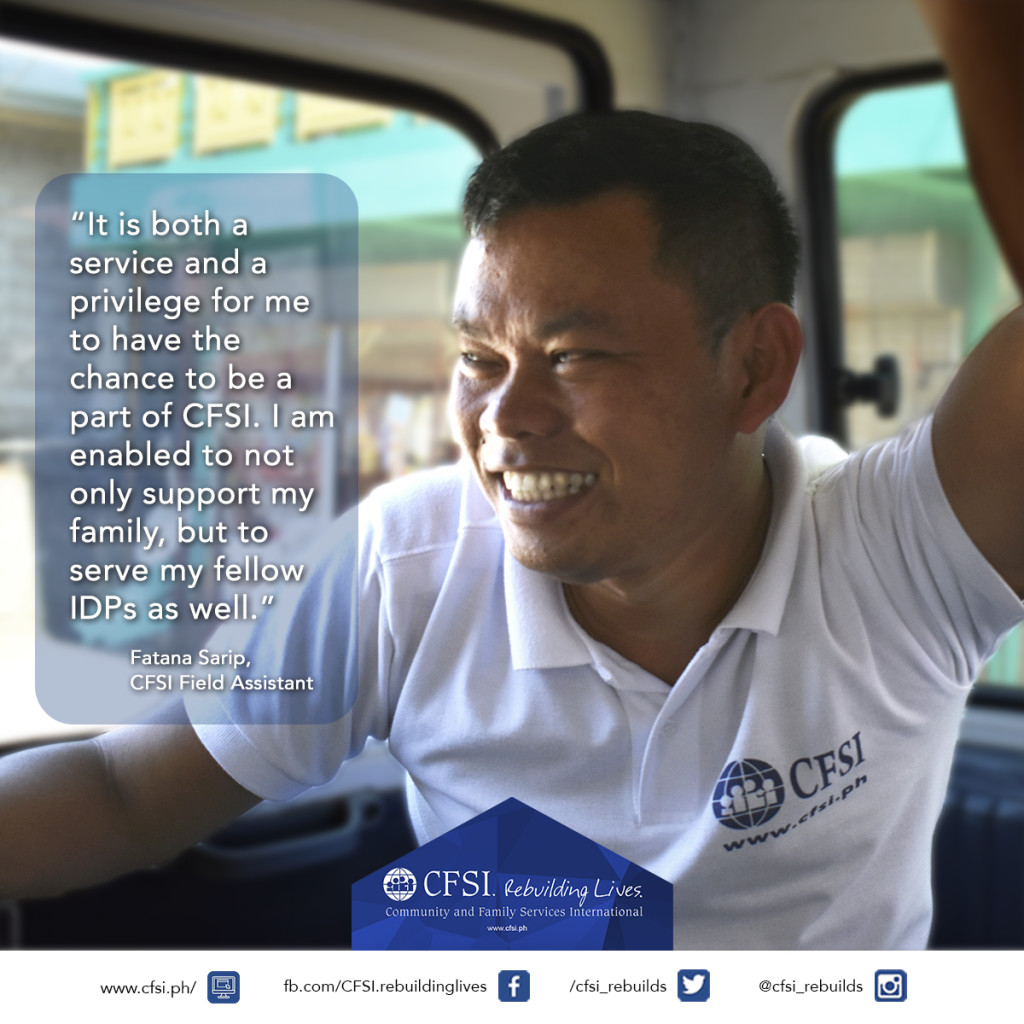This article was written by Omarjah Mohammad Yasser, a Field Assistant under the Marawi Recovery Project (MRP). He has been working with CFSI since June 2018 and is assigned in Sarimanok Tent City and Barangay Bubong Punod in Marawi City.
—
Thousands of Muslim Meranaws were affected by the Marawi siege in May 2017, with each life telling of a unique story of adversity, hope, and resilience.
The family of Fatana Sarip is just one of the numerous families who were able to flee and evacuate from the crisis in Marawi. At present, they are still seeking refuge in a tent in the Sarimanok Evacuation Center in Marawi.
Fatana, 31, is married and blessed with two children. A teacher by profession, he and his family had lived in Brgy. Bubong Lilod Madaya in Marawi City until the outbreak of war in their hometown.
In an effort to find safety, they abandoned their home and moved from one evacuation center to another. At first, they took shelter in Sta. Elena Evacuation Center in Iligan City where most evacuees rely solely on relief goods.
After nearly a year of staying in Sta. Elena, they were transferred to Sarimanok Tent City. At first, Fatana’s family and other internally displaced persons (IDPs) lacked basic necessities such as potable water, food, and medicine. Many residents in the Tent City became more dependent on the distributed relief items because most of them had no source of income.
Community and Family Services International (CFSI), supported by the Australian Government, came to the forefront to help vulnerable IDP families through the Marawi Recovery Project (MRP) by providing aid in the form of livelihood, protection, and psychosocial support.
In the course of the implementation of the MRP, CFSI found Fatana to be hardworking, with adequate knowledge and influence in his community. He exhibited compassion and altruism for other IDPs, despite being one himself. Because of this, he was identified as a prospective candidate when CFSI needed additional hands onboard the project team.
Shortly after, he was hired by CFSI to work as a Field Assistant. To Fatana, this was a fine opportunity for him not only to be involved in purposeful work, but also to be able to support his family financially again.
Since then, Fatana has been an asset to the organization, especially to the MRP, because of his ability to conduct activities in the community and build rapport with his fellow IDPs. He even works during his day off, and undertakes additional volunteer work.
In fact, even his own tent seemed to have become an office where he constantly attends to the concerns of his fellow IDPs. This helps the MRP team respond to feedback more efficiently. Further, Fatana acts as the point of contact for CFSI when coordinating with the camp manager, parent leaders, and various members of the community.
Fatana shares, “Mala miini ugop rakn a cfsi aya kiya sabapan sa kiyapa ka kowa akn sa kawyagan a ipagoyag akn ko pamilay akn na sabap saya na mitataros mambo a paka ugop go diya akn dika paka serbisyo ko mga datar akn a mga IDPs.” (“It is both a service and a privilege for me to have the chance to be a part of CFSI. I am able to support not only my family, but serve my fellow IDPs as well.”)
His story is a story of success, from fleeing war and being displaced to finding his place in a community and answering the call to serve.
The Marawi Recovery Project (MRP), implemented by CFSI, is supported by the Australian Government and aims to promote the protection, psychosocial, and economic recovery of around 6,500 households affected by the Marawi Siege.
To learn more about the Marawi Recovery Project (MRP), you may view the MRP Project Brief here.


